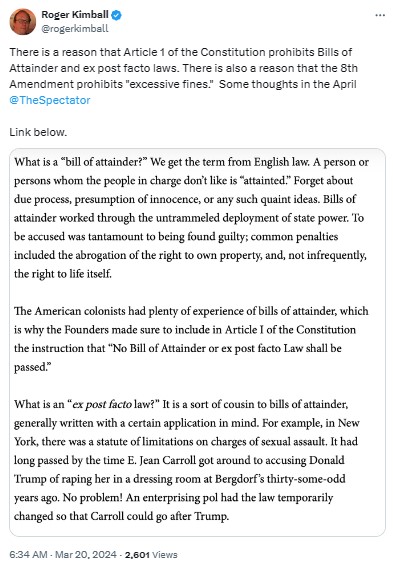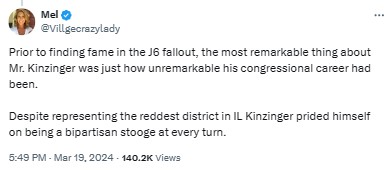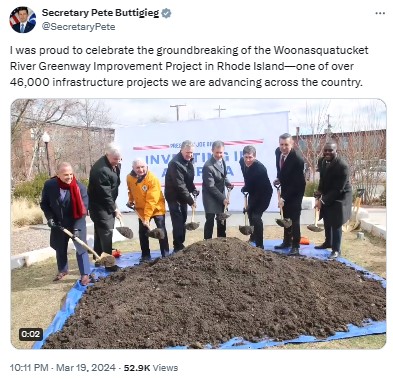Roger Kimball has in mind, here, the attacks on Donald Trump:
The disappointing thing is how many Americans just don’t care, because the Democrats have whipped them into a frenzy of hatred. We are fortunate, indeed, to have basic rights protected in our fundamental laws, but no piece of paper can withstand the desire of a mob when it takes power. If too many people allow their principles to be corrupted, and if too few speak to uphold those principles that once were shared, the mob will have its way.
[Open full post]Yes, we’ve reached the point that the place to get real, non-partisan journalism is on a social media platform from such people as “Mel,” whose X address is Villgecrazylady. For example:
The thread that follows explains how former Congressman Adam Kinzinger — a darling of the J6-investigation crowd — turned campaign donations into usable funds. Another good example is this pinned post from September 3, which observes the amazing and sudden shift of national politicians to micro-donations. There sure is a lot of smoke around this area; why aren’t mainstream journalists digging into it?
(Meanwhile, by the way, if you’re a Rhode Islander who wants to have some small effect on the well-being of your town or school district, you better find time to keep your miniscule campaign finances in order!)
[Open full post]The point can’t be stressed enough that Rhode Islanders should understand the Washington Bridge debacle as a representative lesson on our state government. For that reason, not the least, Mark Patinkin’s conversations with local affected business owners is an article to print and review periodically in the future. Restauranteurs and venue owners bought and built their businesses with dreams of serving their communities. They have plans for improvements that would employ local contractors; they want to know their customers; they want the future to be better because of their work. And their revenue down by large percentages because of incompetent state government.
Perhaps the most–Rhode Island theme comes with this:
“We’re caught in the middle and nobody’s helping us,” said Steve. By “nobody,” he means the state. …
The only aid offered so far has been a low-interest loan from the federal Small Business Administration. But Bill Foeri told me that applying is arduous. And with a 4% interest rate after a grace period, it’s hardly a rescue package.
The state is offering debt, but these business owners don’t want debt. “That sinks us faster,” says one. They want grants, but that’s a trap, too.
Here’s the practical reality Rhode Island business owners have to understand: Our state government is not there to serve you. It’s there to take money from you. To bleed you. The business model of the state is to provide government services and funnel money to the key constituencies of the political machine (union organizers, lawyers, activists, partisans, etc.) and then to find others to pay the bill. If you’re not a perpetual government dependent and you’re not among those key constituencies, your role is to pay the bills. It is that simple and straightforward.
So, when the people who are supposed to pay the bills need genuine help, the RI Democrats don’t know what to do. They can maybe get you some debt, which ensures your creditors profit (because they’re insiders), and they might even manage to pay your debt off for you, if it indebts you to the politicians for votes and somebody else can be made to pay.
But think of all the possibilities that aren’t even on the table. The catastrophe is of the government’s making, so you’d think the threshold would be high for its response. The legislature is in session right now. They could cancel income taxes for affected businesses. Better yet, they could suspend the sales tax for the area until the bridge is rebuilt; that would be an instant 7% discount for risking the traffic for shopping. Parking restrictions could be lifted. All regulations could be reviewed to lift those with the least benefit for the burden. To speed things along, they could suspend at least some of the onerous labor rules that make public infrastructure so insanely slow and expensive in the Ocean State.
The list goes on and on. The first thing they could do is convene a commission to (quickly) assess all the ways in which the big-government-state government could help these families. I guarantee that a smart advocate with a mandate and a couple weeks could make up for most of the lost business with tax and regulatory relief.
But the politicians who run Rhode Island won’t do that sort of thing. The businesses are supposed to pay the bills, and if government behaves differently during a state of genuine emergency, other people might begin to wonder why a government that is supposed to represent them isn’t always looking for ways to make their lives easier and better. We can’t have that, now can we?
Featured image by Justin Katz using Dall-E 3 and Photoshop AI.
[Open full post]I’m still puzzled by the presence of the leader of the Rhode Island Foundation in this image:
Is the foundation involved with this project, was this just a bunch of buddies hanging out for a photo op, or is there really no space at all between state government, federal government, and the non-profit sector — all united under the Party?
[Open full post]To be honest, I feel for Gus Schumacher, the young man whom many conservatives mocked when he was the target of pointed questioning from Republican Senator John Kennedy:
Yes, it’s telling that an ostensible witness for greater government control as a response to “climate change” knows very little about the science, but we’ve raised several generations believing a progressive fallacy. Our focus should be there, not the least because it has such opportunity for revelations on their part.
An underlying conceit of progressivism is that what needs to be done is obvious. Schumacher may, indeed, be an expert on that which he’s observed as an Olympic cross-country skier, but he should have some humility when advocating for a particular interpretation of the causes and, especially, humanity’s appropriate response.
The urge to “just do something” is deadly dangerous, and I’m not sure mockery is going to change the hearts of those who’ve been indoctrinated to cultivate it as a first response.
[Open full post]Arguably, Eric Abbenante— overstates the degree of “debate” in this clip featuring Dr. Phil and Bill Maher, but the difference in point of view he highlights is the crucial one. Here’s Abbenante:
Bill Maher and Dr Phil debate the importance of family and religion:
“You think family and faith are a big fix to the problems we have. I don’t have a family, and I definitely don’t have faith”
“Then you’re definitely not part of the solution”
Bill Maher being anti family is frankly, eugenic.
Maher actually nods toward — and quickly veers from — a key point when he says that the country is headed in his direction and that Dr. Phil might argue that’s why things are falling apart. That’s precisely what I would argue, but not in the direct, practical way Maher (and Phil) suggest.
There’s a step between “no faith or family” and “country falls apart.” What we have in the West, right now, is a meaning crisis, which is manifesting in all sorts of ways, and which will be the end of our civilization if we don’t turn back from it. Our loss is not a practical calculation that can be fixed. Dr. Phil argues that faith and family intertwine to produce children, the absence of whom necessitates immigration, which creates additional problems. To this, Maher and his sympathizers might respond that we need only solve those problems, and we’ll have solved the problem of lost faith, too. But they’ll never manage to knot all the loose ends of this unraveling fabric.
If Dr. Phil had made the full case I’ve heard from him on the shows of those who agree with his beliefs, Dr. Phil might have asked Maher whether he is genuinely happy. We can predict that Maher would have offered an enthusiastic “yes,” and while we might suspect he is not as happy as he claims, or is deceiving himself in some unhealthy way, we cannot read his heart. In any event, our suspicions will never overcome his own testimony about himself.
The happiness question is only to set up the next questions: Does he believe that he’s been fortunate in his life? Of course he has. How many people does he think can follow his path? Not that many.
And then to empathy: Does he think that those who have not enjoyed his good fortune might, on average, have needs — not material needs, but emotional and spiritual needs — that are, at least, distinguishable from his? Does he feel they deserve comfort and confidence in life, even where good fortune doesn’t supply material comforts in abundance?
Here, a socialist might take the microphone to insist we need only take some of the abundance from the Mahers and give it to those who are less fortunate. Even if Maher would assent, however, this wouldn’t fill the lack. People don’t want only comfort; we want meaning, as well… maybe above all. Being given comfort without having earned it does not answer our longing.
Yes, members of our society increasingly long for the life of the Mahers, both in financial success and the meaning we imagine comes with notoriety. This might explain the trend of young adults’ turn to social media to find a life like Bill’s as “influencers.” At least in his version of that trajectory, Bill Maher has encouraged genuine conversation and thought; how quickly his example deteriorates!
The rich man who happened to be out on his yacht when the flood came cannot claim his good fortune disproves the necessity of solid ground. And the rest of us should not look to a celebrity who enthusiastically applauds the decline in church attendance — which heralds the deterioration not only of organized religion, but also of family and community — as representative of anything other than a dark, cynical error from which we must turn away.
Featured image by Justin Katz using Dall-E 3.
[Open full post]I don’t doubt Ken is being honest about his findings, or lack thereof, from his voter fraud review in 2020, but from the very first, I’ve though he’s was overstating his scope and the extent to which his investigation was conclusive. Very plainly put, “I did not find evidence” is not the same as “there is no evidence to be found.”
Mark Davis, who also investigated the election, takes Block to task on exactly these grounds in an important article on The Federalist which honest journalists would ask Block about in every interview. Unfortunately, we’re a long way from a civic society in which such things could be expected.
One suspects that if Block’s book told an opposing story — if it were Proven, rather than Disproven — its national promotion would have been much less enthusiastic. Odds are good the local media in Rhode Island would have ignored it entirely.
That’s the civil society in which we live. The guardians of the public square aren’t interested in robust, reasonable debate. It’s vulgar political warfare to them. And it’s disappointing to see a good-government advocate cash in on our devolution. Davis ends by suggesting Block won’t likely be hired to do such work again, given how publicly he’s betrayed the trust of his highest-profile client. Local reformers in RI should take note, too.
[Open full post]Joe Biden abusing the authority of his office to buy votes by transferring student loan debt to other Americans is back in the news, and it reminds me that I haven’t seen any mainstream coverage of a disaster facing just about every college-bound family in the United States this year:
If, like me, you have a college-bound high-school senior in your family, you’ve likely been on the receiving end of yet another colossal screw-up by our federal government: the overhaul of the Free Application for Federal Student Aid, commonly known as the FAFSA. Every year, students (or more commonly their parents) need to fill out the FAFSA with information about their income, assets, and expenses in order to qualify for federal student aid. Many colleges require the FAFSA before awarding other forms of need-based aid, and some require it to be filed even by people without need before they can qualify for scholarship aid. There’s a more detailed and onerous form, the CSS, operated by the College Board and required by some schools. Filling these out is like doing your taxes, only more so. Typically, the forms are available in October, and schools may set filing deadlines in the fall so that they can deliver financial-aid awards at or near the time they send out acceptances.
Not this year. The FAFSA wasn’t even fully available until January 8, after the Department of Education briefly flicked on the lights on the form on December 30 just so it could claim that it launched in 2023.
This is not just conservative media hype. My family is grappling with this at the moment, and yet the regime media seems not to care. The media’s inability to hold Democrats accountable is one of the strongest argument for voting for the other party, even though Republicans aren’t as apt to give you cash for your vote.
[Open full post]On WNRI 1380 AM/95.1 FM, John DePetro and Justin Katz discuss:
- Avedisian tea leaves
- Lawyers on the case of the Washington Bridge
- Neronha v. McKee via text
- Voting becoming less and less secure
- Bike lanes v. traffic emergencies
- Lawyers make out on stadium deal
- The RIGOP goes all volunteer
Featured image by Justin Katz using Dall-E 3.
[Open full post]For an academic project not long ago I reviewed data on RIPTA bus routes, including surveys of riders of every line in the system, so the unstated assumption of Antonia Noori Farzan’s recent Providence Journal article on the subject jumped out at me. The headline is, “What’s it like to rely on RIPTA to get around the state? We tried it for a week.” And the not-quite-articulated assumption is that traveling around using public transit should be attractive even when compared with the ease of cars in a suburban area.
There simply is not the demand to maintain a system that can get any given person to any given location in the state painlessly. The area didn’t develop for that, and the people don’t really want it.
Frankly, I doubt progressives even want to provide it for them. It would take larger buses that require fewer drivers in urban areas and smaller buses (or vans) with more amenities for suburban commuters and others, perhaps with less-expensive labor. Journalists would start writing articles about the contrast in comfort level between the two, while at the same time expressing outrage that urbanites have to pay so much to travel to the suburbs.
Cars are efficient modes of travel, and they are symbols of freedom. Government should focus on improving our infrastructure and reversing the regulations designed to make them too expensive for working class Rhode Islanders.
[Open full post]







